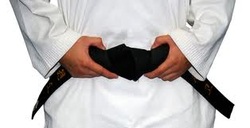|
A MEMBER OF THE INTERNATIONAL BUDO ASSOCIATION  The Okinawan Karate Jutsu which gave rise to Karate-do had no need for grades of competence since it was a fighting system in which you either excelled or failed. Master Chojun Miyagi made this point succinctly when he said that, if a student was good enough, he did not need a mark of competence such as a coloured belt, if he was good enough he wouldn`t get one anyway. Nevertheless, it was considered appropriate to institute a series of examinations, conducted at regular intervals during training, with the object of evaluating the student`s competence and identifying it by means of a coloured belt. At first there were only three colours of belt: The white belt was used to denote the novice, the green belt, the intermediate, the brown belt, the advanced student. Later on, additional colours were added as the number of grading examinations increased. A typical progression of belt colours is given below: 10th Kyu Red 9th Kyu Yellow 8th Kyu Orange 7th Kyu Green 6th Kyu Blue 5th Kyu Purple 4th Kyu Purple/Brown Stripe 3rd Kyu Brown 2nd Kyu Brown/2 Red Stripes 1st Kyu Brown/ Black Stripe 1st Dan Black Belt, 1st Level 2nd Dan Black Belt, 2nd Level There may be as few as six, or as many as ten Kyu grades in any Ryu. In order to pass from one to another, the student takes comprehensive examination based upon the techniques he has learned thus far. Those required for each grade are listed in the syllabus of the Ryu. The average time which must elapse between gradings is three months. In the case of the brown belt six months must elapse between second and first Kyu and first dan. The black belt is a mark of competence and is usually attained with five years of joining the club. There are stages within the black belt known as the dan grades and as in Kyu grades, examinations are governed by the length of time a grade has been held. The following table is that of the world union of karatedo organisations, the governing body for world karate: 2nd Dan 1st Dan must be held for two years 3rd Dan 2nd Dan must be held for three years 4th Dan 3rd Dan must be held for four years 5th Dan 4th Dan must be held for five years 6th Dan 5th Dan must be held for six years 7th Dan 6th Dan must be held for seven years 8th Dan 7th Dan must be held for eight years 9th Dan 8th Dan must be held for nine years 10th Dan 9th Dan must be held for ten years THEREFORE, a person who has gained his first dan at the age of 18 would, assuming that he took and passed all of the intermediate grades, become a ninth dan at the age of 62. A tenth dan is the highest grade that can be awarded within a Ryu. The founder, or Kancho, may take this grade. Some founders consider that are beyond grades in their Ryu. Seventh and eight dans are allowed to wear a belt that alternates red and white banded, while ninth and tenth dans wear all red belts. Since the red belt is often used to denote the complete novice, the masters return to red symbolizes the principle of karate, that he has` forgotton `all techniques and returned to the beginning. With the grade held goes a specific title. Above sixth dan, the title Shihan ( synonym= hanshi ) is used. Between third and sixth dan the title Sensei applies. Below third dan the correct title Sempai. If, however, a first or second dan operates his own dojo, then it is correct to call him sensei. The corps of black belts withina Ryu are known as yudansha. Advancements in grade up to and including the rank of third dan are taken by examination against the syllabus of the Ryu. Above that level, they are conferred in reoginition of diligent training. The Karateka carries a record of his training in the form of a licence book. Wach time he advances a grade the book is endorsed accordingly.. Karate is like boiling water, if you do not heat it constantly, it will cool Karate begins with a courtesy and ends with a courtesy
0 Comments
Your comment will be posted after it is approved.
Leave a Reply. |
Sensei Steve Costello's news Archives
July 2014
Categories
All
|

 RSS Feed
RSS Feed
